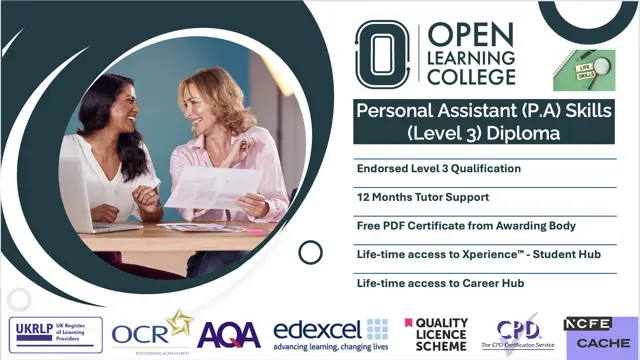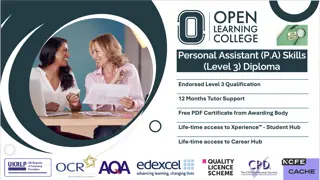
Personal Assistant (P.A) Skills (Level 3) Diploma
Distance Learning Course, featuring tutor support and AI assistance, available online or as a study pack option.
Open Learning College
Summary
Funding options available on our website
- QLS & OPA - Free
- Exam(s) / assessment(s) is included in price
- Tutor is available to students
- TOTUM card included in price What's this?
Add to basket or enquire
Overview
Embark on a transformative learning journey with the UK’s most innovative home study provider, offering courses designed to unlock your true potential and facilitate the career change you desire. Access our distance learning courses directly from anywhere, anytime, and acquire industry-recognised Professional Qualifications essential for advancing in your career.
Specifically, explore the flexible and convenient Personal Assistant (P.A) Skills (Level 3) course, an ideal way to gain a diploma qualification. Whether you aim for further education, improved job prospects, or expanded knowledge, this comprehensive course allows you to prepare thoroughly for exams or careers through home study. Plus, it’s structured to be accessible and beneficial even if you have no prior knowledge in Personal Assistant (P.A) Skills.
This diploma is designed to assist those interested in developing their skills in an office environment. Whether this environment is part of a large office in a major corporation or as an office in your spare bedroom. This course will help you improve your PA skills. The aim of this online personal assistant course is to provide learners with the opportunity to develop their PA Skills, and its associated principles and practices. The course is also designed for those who work in either a small business or larger corporation who would like to develop their knowledge and understanding of the subject and their role within the organisation.
Learners will study many different aspects of the role of a PA; from looking specifically at communication and relationships skills, to the impact of technology upon organisation, and management skills. Learners will also consider the role of Human Resources, the recruitment process and how to manage difficult professional behaviours.
Throughout the course you will have the opportunity to evaluate and interpret case studies that will further your understanding of the models discussed in this diploma. There are a number of Independent Study activities in each unit; these are designed to further the students understanding of key points and Learning Outcomes.
Achievement
Certificates
QLS & OPA
Digital certificate - Included
Open Learning College have undergone external quality checks to ensure that the organisation and the courses’ it offers meet a high standard. Regular reviews of our courses are carried out as part of the endorsement process.
The course depth and study has been benchmarked at Level 3 against level descriptors published by Ofqual.
Visit www.qualitylicencescheme.co.uk for more information.
1. You will receive your accreditation directly from QLS, once you have successfully completed your course (certification fees are included in the course fee).
2. You will receive the Open Pathway Accreditation Diploma (OPA.dip) from Open Learning College.
Course media
Resources
- Personal Assistant (P.A) Skills Level 3 (QLS) Course -
Description
the Personal Assistant (P.A) Skills (Level 3) course is divided into 10 modules.
Module 1: The Role of a PA
In this first module of the diploma you will explore the role of a PA in both small companies and large corporations. The module focuses on the various roles and duties that a PA will be expected to carry out and also how to develop PA skills through goal setting and building self-confidence. This module also explores the importance of professional networking and includes an overview of health and safety considerations and protocols in the professional environment.
Module 2: Communication
This second module will help you to understand the importance of effective communication within the professional environment. The module also explores how to manage a breakdown of communication within a working team and how to manage sensitive information.
This module discusses verbal and non-verbal techniques, including;
- Body Language,
- Mirroring,
- Eye contact,
- Posture,
- Listening skills,
- Telephone skills.
Module 3: Information, Communication and Technology
This module will help you to explore how to use technology to create business documents such as letters, emails and spreadsheets. The unit includes discussion of;
- Word processing software,
- Formatting,
- Graphics,
- Spreadsheet construction,
- Presentation software,
- Creating databases.
Throughout this module there are study activities which will help you to practice the skills and processes outlined in the module and these exercises will form part of the end of unit assessment. The knowledge and skills learners learn in this unit will be drawn on in future study units.
Module 4: Presentations and Social Media
In the fourth module we will explore the role of a PA. In the role of PA you will be expected to compile and research presentations, and you will also be expected to present them on. Therefore, in this module you will explore how to prepare for a presentation; methods of research that you might want to use and how to conduct yourself during a presentation. This module also looks at the influence of social networking and social media in the role of a PA and discusses sites such as;
- Twitter,
- Facebook,
- LinkedIn.
Module 5: Organisation and Management
In the fifth Module we explore an important area of the PA role. Stress is a serious condition that can affect employees at all levels, this module explores techniques that a PA can use to reduce and control stress risks through the management and organisation of workloads. This module also explores the following areas;
- Time management,
- How to prioritise work,
- Managing stress,
- Developing organisational skills.
Module 6: Meeting and Event Planning
Organising meetings, or event planning, can be a daunting task. In this module of the diploma we explore how to prepare for meetings and also how to plan and arrange events. The module also includes discussion of how to run a successful meeting, event, and also how to evaluate functions. This unit discusses the following areas;
- Location,
- Agenda setting,
- Attendees,
- Supporting documentation required,
- Budget.
Module 7: Meetings and Minute Taking
This seventh module of the diploma explores another key area of the PA role. The benefits of minute taking at meetings and explores effective techniques for this process. The module discusses different methods of recording meetings, technological aids, and what to do with the meeting minutes once the meeting has ended.
Module 8: Recruitment Process
As part of the role of a PA you may be required to participate in the recruitment of new support staff. The eighth module of the diploma therefore explores the recruitment process and interview techniques such as the STAR (Situation, Task, Action and Result) technique. In this module you will also learn how design a job advertisement, how to evaluate applicants and CV’s and also techniques you can use to arrange assessment days for potential employees. In addition, you will also learn how to keep records of interviews and how to interpret the results to ensure that the right person is hired for the job.
Module 9: Human Resources and Relationships
This penultimate module explores the role of the Human Resources Department and how it is linked to the role of a PA. The module also includes discussion of the following areas;
- Handling sensitive information
- Confidentiality
- Employees rights
The module also explores how to manage relationships in the professional environment whilst respecting established office politics and practices. You will also have the opportunity to evaluate and interpret case studies and decide upon any action and their results in this part of the course.
Module 10: Managing Professional Conflict
This final module of the course explores the potential for professional conflicts when dealing with both clients and fellow employees. The module explores different management and problem solving techniques that can be used when dealing with conflict in its verbal and non-verbal forms. You will also have the opportunity to read and evaluate case studies of conflict and difficult behaviours and to develop your own solutions in this part of the course.
What Will You Learn?
- The Personal Assistant (P.A) Skills course delves into a comprehensive array of skills essential for effective administrative support.
- Participants will acquire proficiency in office management, communication strategies, and time management techniques crucial for efficient workflow.
- This includes mastering diary management, event coordination, and effective communication, both written and verbal, within professional contexts.
- The course covers essential software applications for administrative tasks, enhancing proficiency in spreadsheets, databases, and presentations.
- Participants will also gain insights into handling sensitive information, managing priorities, and problem-solving, vital in supporting high-level executives or teams within various organizational settings.
- Additionally, the course delves into interpersonal skills, etiquette, and professional conduct, ensuring a well-rounded skill set for successful personal assistants.
Who is this course for?
- The Personal Assistant (P.A) Skills course is tailored for individuals interested in developing or refining their administrative competencies, particularly those aiming to pursue a career as a personal assistant or executive assistant.
- It's suitable for professionals across industries seeking to sharpen their organizational abilities, communication prowess, and proficiency in office management.
- This course is also beneficial for those transitioning into a personal assistant role, providing foundational skills and knowledge required to excel in this critical support position.
- Whether you're starting anew in the administrative field or looking to enhance your existing skill set, this course equips you with the expertise necessary to thrive in demanding and fast-paced work environments.
Requirements
- The good news is that no prior learning knowledge or experience is essential to take this course. This course is openly available to anyone wishing to learn more about Personal Assistant (P.A) Skills (Level 3) and would like to take part in a highly rewarding distance learning study course.
- We believe that everyone should have the opportunity to expand their knowledge and study further, so we try to keep our entry requirements to a minimum.
- You have the freedom to start the course at any time and continue your studies at your own pace for a period of up to 12 months from initial registration with full tutor support.
Career path
Behind every manager or company director, you’ll find an organised, efficient personal assistant. Discover what this varied and dynamic career has to offer
Questions and answers
Reviews
Currently there are no reviews for this course. Be the first to leave a review.
Legal information
This course is advertised on reed.co.uk by the Course Provider, whose terms and conditions apply. Purchases are made directly from the Course Provider, and as such, content and materials are supplied by the Course Provider directly. Reed is acting as agent and not reseller in relation to this course. Reed's only responsibility is to facilitate your payment for the course. It is your responsibility to review and agree to the Course Provider's terms and conditions and satisfy yourself as to the suitability of the course you intend to purchase. Reed will not have any responsibility for the content of the course and/or associated materials.



